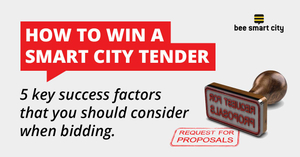Winning a smart city tender isn’t a matter of luck. It’s a matter of skilled planning, careful estimations, honest evaluations, a trustworthy relationship, and a solution that ultimately solves the city’s problem.
Government contracts are lucrative contracts, but they’re not easy to land. The competition can be fierce, and unless you’re armed with the proper knowledge, the right product, and a good strategy, your proposal will fall flat before the decision-makers have even had the time to look at it. It’s a sad reality, but it’s true.
Solution procurement is a challenge for any city. They’re overwhelmed with great ideas, and smart city innovation teams don’t have infinite time to go through every single proposal in detail. But there are few strategies to employ to make sure that your proposal stands out.
Securing a smart city tender isn’t much different from landing a pitch or acing a job interview, but your approach needs to be tailored to the situation. The stakes are much higher with government contracts, and the performance of your product may have far-reaching implications.
To increase your chance of winning a smart city tender, we’ve put together some sure-fire strategies that will lead to success.
1. Demonstrate Your Expertise
When city governments invite bids for large projects, they expect those bidding to fully understand the nature of the project. By “fully understanding”, city governments mean two things. Firstly, understand the nature of the challenge and use your expertise to find a suitable solution. And secondly, understand the nature of government procurement and the constraints and limitations that go along with it.
Focus on the challenge you’re trying to solve and explain how your product is the perfect solution and why you are the right person to deliver that solution. The best way to demonstrate your expertise is by proving that your product works and delivers clear benefits, with proven use cases and a fundamental understanding of the assignment.
As for the second problem, it’s important that you understand that cities operate with different constraints than private enterprises. With that in mind, it’s important to keep your costs realistic and within budget. If a solution is too expensive to pilot, it’s likely to be passed over.
2. Build Trust
You will always struggle to win any big contracts without being able to build trust. Building trust is a slow and time-consuming process, but it’s an essential foundation to a strong working relationship. There are a number of ways to build trust.
The first is very much like the point above: you need to be able to demonstrate your expertise. The best way of doing this is by showcasing a portfolio of successful solutions and previous partnerships. This should be simple for established companies, but what about new companies with fresh innovations?
A tried and tested way to prove that you’re trustworthy, reliable, and capable is by getting involved in the community. This could be indirectly by providing services to the private sector, engaging with charitable enterprises within the city, and supporting other local agencies. Another great way to prove yourself is by taking part in challenge-based programs hosted by the city. It puts you on the map and shows your ability to work to a brief and deliver a solution, whether it’s piloted or not.
3. Know Who You’re Pitching To
The term “government” may conjure up images of a grim, faceless entity, but that’s not the case. City governments are run and operated by enthusiastic citizens who are actively looking for real solutions to the city’s problems. A city’s smart city team will be comprised of truly dedicated individuals who are passionate about new tech, innovative frameworks, and different ways of thinking.
It doesn’t hurt to do a little digging to see who you’re going to have to impress. By following a smart city department’s social media, you can get an idea of how the team operates and the city’s overarching strategy. If you can tailor your proposal and product to match the tone and voice of the city’s smart city division, then you’re more likely to be seen as a good fit.
It’s also worth highlighting one of the points made above: don’t forget that you’re pitching to a government agency and not a private enterprise. Cities work and operate differently to standard business models, with stricter budgets and other limitations. Keep that in mind before sending off a proposal with an unrealistic budget!
4. Provide An Inspirational Solution
The best way to win a smart city tender is to provide a unique, innovative, and cost-effective product at the end of the day. However, if you can deliver a product that solves several problems in one product, then you’re onto a winner. A solution that responds to a city’s needs is great, but if it can inspire solutions to further problems, then your product will be a more attractive option by far.
If there is a way to implement your solution using existing city infrastructure or by providing the means to generate a whole host of new solutions, you should highlight that in your proposal. For example, suppose a city is looking for an attractive waste management solution but is also looking for a way to boost Wifi and connectivity within specific areas. In that case, a proposal that could effectively solve both of those problems will be more appealing to those calling the shots.
But even if your solution can’t solve all of a city’s problems at once, by highlighting how it could integrate with other programs, inspire new solutions, or highlight areas that haven’t been looked at, it could be more useful to a city’s government in the long run.
5. Don’t Forget The Details
It’s all in the details. “Details” can mean several things, and it certainly is a broad term. That’s why you need to make sure that you prepare your tender application extra carefully. Firstly, make sure that you use the correct documents and fill in those response forms accurately.
If there is a word limit, then stick to it. If certain information is required, make sure that you provide it. Make sure your spelling is correct and that you’re using the right language. An accidental typo could suggest carelessness. The use of slang could be seen as unprofessional. It sounds harsh, but pitches have fallen flat for less. In reality, minor mistakes can be overlooked if the actual solution being pitched is sound. Still, you don’t want to run the risk of losing a lucrative contract over something so trivial.
Typos, word count, and language choice are one thing, but one area where you can’t afford to make mistakes is in the numbers department. Your numbers need to add up, and your estimations need to be accurate. Don’t pull figures out of thin air. Instead, provide accurate, detailed estimates with realistic numbers.
LAST WORDS OF ADVICE
Always keep in mind that you can’t win every tender. However, if you’re consistently facing rejection, it’s a wise idea to ask for feedback about how your proposal performed in comparison to the successful bidder. Was there something about their proposal that scored more points? Did you overlook an essential element? Asking for feedback is a great way to help your chances in future bids.
Failing that, it’s also worth asking a third party to critique your proposal and offer advice on how to strengthen your weaknesses.
If you are not familiar with the essential acronyms of the tender process, don't worry. We’ve put together a short Tender Glossary to help you navigate your way through the process and understand tender terminology.
Armed with this information, your next tender submission will lead to success!
How TO find current tenders
Check out our globally curated list of smart city tenders, which is updated twice a week to provide you with new business opportunities. Be informed about new tenders in your areas of interest via the tender alerts function. The tender service is part of our Tender Premium Membership on bee smart city. To try out the tender service at no risk, start today with a 14-day free trial!


